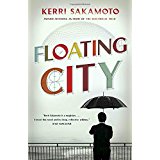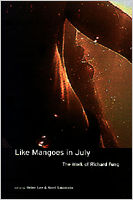
Kerri Sakamoto was born in Toronto. A graduate of the University of Toronto, she also earned an M.A. in English from New York University. While The Electrical Field is her first novel, she has published short stories, written scripts for independent films, and has written extensively on Asian North American art. Sakamoto is a member of the Gendai Gallery that opened September 30, 2000 at the Japanese Canadian Cultural Centre in Toronto, where she currently resides. Sakamoto is the winner of the 2020 Writers’ Trust Engel/Findley Award that recognizes a mid-career author’s contributions to fiction.
Fiction
The Electrical Field
Toronto: A.A. Knopf, 1998.
Toronto: Vintage Canada, 1998.
London: Macmillan, 1999.
London: Pan, 2000.
New York: W.W. Norton, 2000.
PS8587 .A318 E43 2000
Toronto: Random House of Canada, 2001.
Publisher’s Synopsis (Knopf Canada, 1998)
When the beautiful Chisako and her lover are found murdered in a park, members of a small Ontario community must finally acknowledge certain inescapable truths about each other. The Electrical Field slowly exposes all those implicated in the murders — particularly Miss Saito, the novel’s unreliable narrator, through whom we gradually discover the truth. … The Electrical Field is set in the 1970s, and reaches deep into the past to explore the dire legacy of the internment of Japanese-Canadians during the war.
Awards and Honours
1998 Governor General’s Literary Award, Fiction–English (Nominated)
1998 Kiriyama Pacific Rim Book Prize (Nominated)
1998 Arthur Ellis Awards (Nominated)
1999 Commonwealth Book Prize –Best First Book (Winner)
1999 Chapters-Books in Canada First Novel Award (Nominated)
2000 Canada-Japan Literary Award-Published Book (Winner; shared with Michel Regnier’s L’Oreille gauche)

Fiction
Floating City
Toronto: A.A. Knopf Canada, 2018.
PS8587 .A318 F56 2018
Publisher’s Synopsis (from its website)
Frankie Hanesaka isn’t afraid of a little hard work. An industrious boy, if haunted by the mysterious figures of his mother’s past in Japan, he grows up in a floating house in the harbour of Port Alberni, BC. With all the Japanese bachelors passing through town to work in the logging camps and lumber mills, maybe he could build a hotel on the water, too. Make a few dollars. But then the war comes, and Frankie finds himself in a mountain internment camp, his small dreams of success dashed by the great tides of history.
After the war, Frankie tries his luck in Toronto, where possibility awaits in the form of a patron who teaches him how to turn effort into money, and a starry-eyed architect who teaches Frankie something harder to come by: the ability to dream big. Buckminster Fuller’s role as Frankie’s outsized spiritual mentor is one of just many real-life touchstones and extraordinary points of colour in this fairytale-like story about family, ambition and the costs of turning our backs on history and home.
Awards and Honours
2018 Toronto Book Awards (Shortlist)
Fiction
One Hundred Million Hearts
Toronto: A.A. Knopf Canada, 2003.
PS8587 .A318 O54 2003
Publisher’s Synopsis
[T]he story of Miyo Mori, who lives a reclusive life in Toronto with her elderly father, Masao, a retired auto mechanic who has cared for Miyo since the death of her mother. When Masao also dies, the past he had kept secret comes back to life … .
[The] novel matchlessly explores the complexities of loyalty and betrayal, sacrifice and cruelty, as Miyo comes to discover the past, the lives of her parents, and the true meaning of the wartime propaganda phrase “One hundred million hearts, beating as one.”
Non-Fiction
Like Mangoes in July: The Work of Richard Fung. (Co-edited with Helen Lee)
Toronto: Insomniac Press, 2002.
N6549 .F85 L53 2002
Publisher’s Synopsis
For almost two decades, Richard Fung has been a major voice navigating complex debates on sexuality, race and representation. As a video artist, critic and activist, he has made formative contributions to queer politics and race critical theory, while forging a new poetics of diasporic identity and narrative hybridity. This comprehensive volume of original commentary and in-depth analysis … provides an essential overview of his pioneering work in contemporary film and video.
Anthology
Tok. Book 2
Sakamoto, Kerri. “The Man Who Built Walls and Tore Them Down.” In Tok. Book 2, edited by Helen Walsh. Toronto: Zephyr Press, 2007, 79-86. [excerpt from a novel in progress]
Selected Criticism and Interpretation
Howells, Coral Ann . “Monsters and Monstrosity: Kerri Sakamoto, The Electrical Field.” In her Contemporary Canadian Women’s Fiction: Refiguring Identities. New York: Palgrave Macmillan, 2003.
PS8089.5 .W6 H67 2003
Lee, Tara. “Promising Transnational Births: The Womb and Cyborg Poetics in Asian Canadian Literature.” Ph.D. diss., Simon Fraser University, 2006.
Available from ProQuest Dissertations and Theses
Miki, Roy. “Rewiring Critical Affects: Reading Asian Canadian in the Transnational Sites of Kerri Sakamoto’s One Hundred Million Hearts.” Chap. in his In Flux: Transnational Shifts in Asian Canadian Writing. Edmonton: NeWest Press, 2011, 207-233.
PS8089.5 .A8 M55 2011
Wilson, Sheena L. “Paradigms Lost and Re-membered: The Case of the Japanese Canadian Experience in Canadian Media, Cinema, and Literature.” Ph.D. diss., University of Alberta, 2006.
Available from ProQuest Dissertations and Theses
Links
Publisher Penguin Random House Canada, publisher of the Knopf Canada imprint
Publisher Zephyr Press





